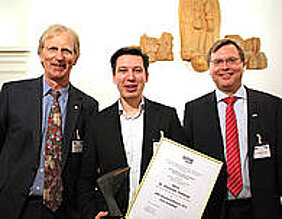Decision Support for Purchasing
27.03.2014In his doctoral thesis Alexander Rothkopf studied the beneficial and adverse consequences of procurement volume consolidation initiatives. He now received the Dissertation Award from the German Association of Materials Management, Purchasing and Logistics (BME) for his work. Rothkopf is postdoctoral fellow at the Chair of Logistics and Quantitative Methods in Business Administration at the University of Wuerzburg.

In 2008, Siemens AG launched an extensive cost reduction programme. Fewer suppliers and more centralised purchasing were supposed to reduce expenditure by approximately €2 billion per year. Similar measures have also been taken by many other companies in recent years. "Companies pursue two interrelated measures to reduce costs in purchasing," Alexander Rothkopf explains. "On the one hand, they reduce the number of suppliers. On the other hand, they centrally control and manage purchasing spend, thus increasing procurement volumes ". The benefits and risks of these measures were explored in Rothkopf’s doctoral thesis "Supplier Selection: Volume Consolidation, Risks, and Incentive Issues".
Surprising results
When companies only rely on a single supplier to save costs, they follow a risky strategy: If this supplier cannot deliver the quantities required or suddenly experiences a breakdown, production at the buying company can also come to a standstill in a worst case scenario. Rothkopf’s work addresses such risks, among other things. "In this case, it may prove useful to apply a multiple sourcing strategy. The purchasing volume is distributed across two or more suppliers to reduce the risk that the entire supply is interrupted, " Rothkopf says.
However, it might not always be optimal to distribute the volume across several suppliers in order to reduce the costs associate with supply interruptions. His research suggests that it may actually be useful to occasionally award the contract to a single vendor. Namely, when the risks of supplier defaults are very different or the compensation costs are very high. "This result is interesting and surprising. Decision makers generally expect to reduce their supply risks whenever purchasing volume is distributed to multiple suppliers,” he explains. To assist buyers in their decisions, Alexander Rothkopf developed decision rules that indicate when it makes sense to distribute the purchasing volume.
In addition, Rothkopf addressed so-called maverick buying in his doctoral thesis. This issue concerns problems that occur when the central purchasing department negotiates framework agreements with dedicated suppliers, but local managers can order from other suppliers on their own initiative, and thereby bypass the framework agreements. Typically, a company tries to prevent such non-compliant behaviour with two measures: First, they can invest in monitoring local managers; second, they can invest in developing techniques that make it easier for managers to adhere to framework agreements. Alexander Rothkopf examined the effectiveness of both measures in his doctoral thesis and concluded that it can be useful for companies to accept a certain amount of non-compliance with framework agreement under certain conditions. "In addition, his research demonstrates that hierarchical planning mechanisms in purchasing may reinforce non-compliance. The theoretical findings suggest that we need new forms of collaboration in purchasing," Rothkopf says.
Prizes for Young Scholars
The BME prizes were awarded early March at the 7th Academic Symposium "Supply Management" of BME in Wuerzburg. Students, graduates, academics, and practitioners met there to exchange ideas at the University of Wuerzburg.
Zurück


